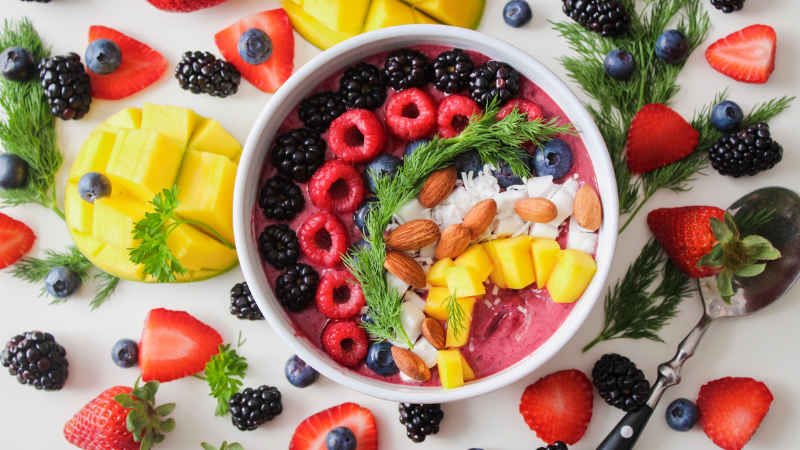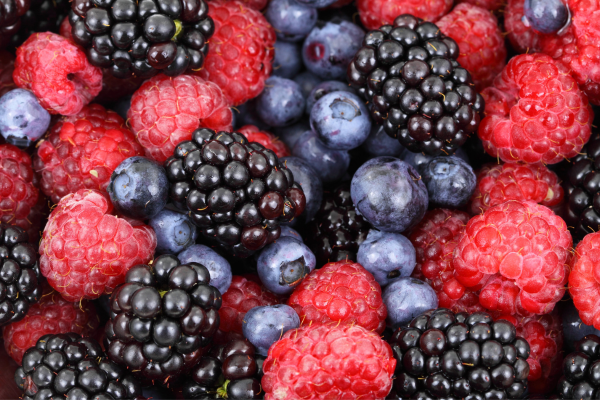Supercharge Your Workout: Power Foods for Physical Wellness
Power Foods for Physical Wellness: Boost your health with nutrient-packed foods like leafy greens, berries, salmon, nuts, and avocados. This article explains their benefits and how to incorporate them into your diet for a healthier lifestyle.

Boost your health and enhance your workout performance with nutrient-packed power foods like leafy greens, berries, salmon, nuts, and avocados. These superfoods from nature are rich in vital nutrients, vitamins, and minerals that play a crucial role in constructing strength, stamina, and overall physical wellness.
Importance of Nutrition in Enhancing Workout Performance
As a fitness instructor dedicated to encouraging physical wellness, I firmly believe that diet plays a pivotal role in maximizing your workout potential. Exercise alone cannot reach its full potential without the right nourishment to power through demanding workouts and support post-workout recovery. Power foods are the cornerstone of building strength, stamina, and overall physical well-being, as they provide essential nutrients that our bodies need to perform at their best.
Introduction to Power Foods and Their Role in Physical Wellness
Power foods are nutrient-dense foods that offer numerous health benefits. These superfoods not only provide essential nutrients but also enhance general physical fitness by boosting energy levels, reducing inflammation, and aiding muscle restoration.
In this article, we’ll explore a variety of power foods that can significantly improve your workout performance. Each food category, including leafy greens, berries, almonds, salmon high in omega-3 fatty acids, avocados high in potassium, and the importance of hydration, will be discussed in detail. Additionally, we’ll provide practical advice on how to incorporate these power foods into your exercise regimen.
Leafy Greens: The Foundation of Strength
Leafy greens are a nutritional powerhouse when it comes to enhancing your workouts. Packed with essential vitamins, minerals, and antioxidants, these vibrant greens support healthy muscle function and overall physical wellness.
Nutrient Density and Benefits for Muscle Function
Leafy greens such as spinach, kale, and Swiss chard are abundant in iron, calcium, magnesium, and vitamin K—essential nutrients for maintaining strong and healthy muscles. Iron aids in oxygen delivery to the muscles, increasing stamina and reducing fatigue during challenging activities. Magnesium promotes muscle relaxation and recovery, reducing the risk of cramps and soreness. Calcium, on the other hand, supports muscular contractions and bone health.
How to Incorporate Leafy Greens into Pre and Post-Workout Meals
Incorporating leafy greens into your diet is both simple and delicious. Consider adding spinach to your morning smoothie or create a nutrient-rich salad with kale, avocados, and grilled chicken as a power-packed pre-workout meal.
For post-workout recovery, indulge in a substantial green salad topped with nutrient-dense almonds and a zesty dressing. Another delightful option is sautéed Swiss chard with garlic and a sprinkle of pine nuts.
Remember to diversify your leafy green choices to ensure you receive a variety of nutrients, and opt for organic options to minimize exposure to harmful chemicals.
Berries: Natural Energy Boosters

Berries are nature’s little powerhouses, providing a fantastic addition to your diet for boosting exercise performance. Packed with vitamins, minerals, and antioxidants, these vibrant fruits offer numerous benefits that can enhance your workouts and expedite post-exercise recovery.
Antioxidant Rich Properties and Workout Recovery
Berries, such as blueberries, strawberries, and raspberries, are rich in powerful antioxidants like anthocyanins and quercetin. These antioxidants help defend the body against oxidative damage caused by vigorous exercise, reducing muscle inflammation and speeding up recovery. Including berries in your post-workout nutrition can lead to reduced muscular soreness and increased energy for your next workout session.
Creative Ways to Include Berries in Pre-Workout Snacks
Create a hydrating and nutrient-rich pre-workout beverage by combining Greek yogurt, almond milk, and a handful of mixed berries. The natural sugars in berries provide an immediate energy boost without the crash associated with processed foods.
Craft delicious and energizing Berry-Oat Energy Bites by combining mashed berries, rolled oats, honey, and almond butter. These bite-sized snacks offer a balance of carbohydrates, good fats, and antioxidants, perfect for supporting your workout.
Salmon: Fueling Endurance and Recovery
Known as the “king of fish,” salmon is a nutrient powerhouse that significantly impacts your gym performance. Rich in high-quality protein, omega-3 fatty acids, and essential vitamins and minerals, salmon benefits both endurance and post-workout muscle recovery.
Omega-3 Fatty Acids: Promoting Joint Health and Reducing Inflammation
Salmon is abundant in omega-3 fatty acids, especially EPA and DHA, which aid in reducing muscle soreness and joint stiffness caused by exercise-induced inflammation. Including salmon in your diet can improve joint health and mobility, ensuring you’re ready for your next workout without unnecessary pain.
Muscle Repair and Growth: High-Quality Protein Source
Protein is a crucial component of every fitness enthusiast’s diet, supporting muscle repair and growth. Salmon stands out as an excellent source of complete protein, providing all essential amino acids for efficient muscle recovery. The easily absorbable protein in salmon ensures that your body effectively utilizes these nutrients.
Post-Workout Meal: Delicious and Nutrient-Dense Options
For a balanced and fulfilling post-workout meal, consider baked, grilled, or smoked salmon paired with roasted vegetables or a quinoa salad.
Experiment with different salmon recipes, such as Grilled Lemon Garlic Salmon or Teriyaki Salmon with Stir-Fried Veggies, to enjoy a delightful and nutritious post-workout option.
Nuts: Sustainable Energy Source
Nuts are an excellent choice for sustaining your workouts due to their numerous nutritional benefits. Rich in protein, good fats, vitamins, and minerals, nuts provide long-lasting energy for your exercise regimen.
Protein and Healthy Fats
Nuts are a rich source of plant-based protein, vital for muscle growth and repair. Additionally, they contain beneficial monounsaturated and polyunsaturated fats, supporting joint health and mobility during physical activity. These fats are also good for heart health and help you stay satiated, preventing mid-workout hunger.
Nut Butter Options and Trail Mix Ideas
Include nuts in your pre-workout routine by spreading almond or peanut butter on whole-grain toast or adding it to your smoothies. Alternatively, mix various nuts, seeds, and dried fruits to create your invigorating trail mix—a snack providing a balanced combination of protein, carbohydrates, and fats to fuel your demanding workout.
Avocados: Supporting Muscle Repair
Avocados, known as “nature’s butter,” are a true powerhouse when it comes to aiding muscle recovery and supporting overall physical fitness. Loaded with essential nutrients, avocados offer several benefits for both athletes and fitness enthusiasts.
Potassium Content for Muscle Cramp Prevention
The high potassium content of avocados makes them an excellent addition to your post-workout diet. Potassium is crucial for maintaining healthy neuron and muscle function. During intense workouts, our bodies lose potassium through sweat, leading to muscle fatigue and cramping. Avocados help restore potassium levels, reducing the risk of cramps and enhancing your overall workout performance.
Incorporating Avocados into Smoothies and Salads for Workout Recovery
Integrate avocados into your post-workout meals to aid in muscle recovery and regeneration. Blend avocados with bananas, spinach, almond milk, and a scoop of protein powder to create a tasty and nutrient-rich recovery smoothie.
Craft a post-workout salad by combining avocados with lush greens, cherry tomatoes, grilled chicken, and a splash of balsamic vinaigrette. This flavorful combination offers a well-rounded diet rich in nutrients necessary for muscle growth and repair.
While avocados provide numerous health benefits, it’s essential to consume them in moderation due to their calorie content. However, their nutrient profile makes them an excellent option for enhancing post-exercise recovery and promoting physical wellness.
Hydration: The Vital Element
Staying properly hydrated is a crucial element in achieving peak physical performance. Hydration supports various physiological functions, regulates body temperature, and supplies active muscles with essential nutrients. During exercise, our bodies lose water through sweat, and failing to replace this water can lead to dehydration. Dehydration, in turn, can hinder recovery, decrease endurance, and impact workout performance.
Hydration Tips and Incorporating Infused Water for Added Flavor
To ensure you stay well-hydrated during workouts and throughout the day, consider the following hydration tips:
- Pre-Workout Hydration: Drink 16 to 20 ounces of water 1-2 hours before exercising to begin your session well-hydrated.
- During-Workout Hydration: Consume 7 to 10 ounces of water every 10-20 minutes during exercise, especially during longer sessions or in hot environments.
- Post-Workout Hydration: After your workout, aim to drink another 16 to 24 ounces of water to rehydrate and aid in recovery.
- Electrolyte Balance: If engaging in intense or prolonged workouts, consider sports drinks containing electrolytes to replenish sodium, potassium, and other minerals lost through sweat.
- Monitor Urine Color: Pay attention to the color of your urine; pale yellow indicates proper hydration, while dark yellow or amber suggests dehydration.
Infused water is a delightful way to enhance your hydration game and make plain water more appealing. Add slices of fruits like lemon, cucumber, or berries to your water for a refreshing and flavorful twist. This can encourage you to drink more water throughout the day.
It’s important to note that each individual’s hydration needs may vary based on factors like body type, exercise intensity, and environmental conditions. Even when you don’t feel thirsty, make a conscious effort to regularly consume water and listen to your body’s signals.
By emphasizing hydration and implementing these simple tips into your routine, you can help your body function at its peak, increase endurance, and hasten post-workout recovery. Hydration is the secret to maximizing your athletic performance and maintaining overall physical fitness. Stay hydrated, stay energized, and confidently work towards your fitness goals.
Timing Your Meals: Optimizing Performance
As a fitness instructor, I cannot stress enough the importance of strategically planning your meals to enhance your workout performance. Proper nutrition before and after exercise can significantly impact your energy levels, endurance, and muscle recovery. Let’s delve into the crucial elements of meal timing to optimize your fitness outcomes:
Pre-Workout Nutrition:
- Timing: Aim to have a balanced meal 1 to 3 hours before your workout. This allows your body enough time to digest the nutrients and convert them into usable energy.
- Carbohydrates: Consume complex carbohydrates like whole grains, sweet potatoes, or fruits, which provide a steady release of energy during exercise.
- Protein: Include a moderate amount of lean protein, such as chicken, tofu, or beans, to support muscle maintenance and prevent muscle breakdown during your workout.
- Hydration: Don’t forget to hydrate adequately before exercise, as even slight dehydration can impair performance.
Post-Workout Nutrition:
- Timing: The post-workout window is crucial for replenishing nutrients and kickstarting muscle repair. Aim to eat within 30 to 60 minutes after your workout.
- Protein: Prioritize high-quality protein sources like lean meats, fish, eggs, or plant-based options to facilitate muscle recovery and growth.
- Carbohydrates: Include fast-digesting carbs like fruits or white rice to replenish glycogen stores, which were depleted during exercise.
- Healthy Fats: Incorporate sources of healthy fats, such as avocados or nuts, to support nutrient absorption and reduce inflammation.
Hydration: Rehydrate after your workout to replace any fluids lost through sweat.
Balancing Macronutrients:
- Carbohydrates: Adjust your carb intake based on the intensity and duration of your workout. High-intensity exercises may require more carbs for sustained energy, while low-intensity activities may need fewer carbs.
- Protein: Ensure you’re getting an adequate amount of protein throughout the day to support muscle repair and growth, not just around your workouts.
- Fats: Opt for healthy fats found in olive oil or fatty fish, as they contribute to overall health and may reduce exercise-induced muscle soreness.
Remember that everyone’s goals and interests may vary, influencing their dietary needs. Experiment with different meal times and food combinations to find what works best for you. Also, pay attention to portion sizes to avoid discomfort during exercise. A well-planned meal timing approach will help you maximize your workouts and bring you closer to your fitness objectives.
Conclusion
Embracing power foods and incorporating them into your diet will transform the way you approach fitness. As a fitness instructor specializing in physical well-being, I have personally witnessed the incredible difference that nutrient-rich foods can make in achieving fitness goals and overall health.
Leafy greens lay the foundation for strength and muscle function, while berries act as natural energy boosters. Salmon, a protein and omega-3 fatty acid powerhouse, fuels both endurance and recovery. Nuts provide sustainable energy for prolonged workouts, and avocados support muscle repair and overall physical fitness.
Remember to stay hydrated and make water a vital element of your exercise routine. Proper meal timing, both pre and post-workout, is essential for optimizing performance and supporting muscle recovery.
By making these dietary adjustments, even small ones, you can make a significant impact on your ability to exercise and your overall well-being. Nourish your body with the right nutrients, and watch as your athletic prowess soars to new heights. With power foods as your fuel, you’ll be well on your way to achieving your fitness goals and maintaining a healthy, energetic lifestyle.
Frequently Asked Questions
FAQ 1: What are power foods for physical wellness?
A: Power foods for physical wellness are nutrient-dense foods that provide numerous health benefits, supporting overall physical fitness and well-being. These foods are rich in essential vitamins, minerals, antioxidants, and other nutrients that promote energy levels, reduce inflammation, and aid in muscle recovery after workouts.
FAQ 2: What are some examples of power foods for physical wellness?
A: Some examples of power foods for physical wellness include:
- Leafy Greens: Spinach, kale, Swiss chard, and other greens rich in iron, calcium, magnesium, and vitamin K for healthy muscles.
- Berries: Blueberries, strawberries, and raspberries packed with antioxidants that reduce inflammation and aid workout recovery.
- Salmon: A great source of omega-3 fatty acids, high-quality protein, and important vitamins and minerals for endurance and muscle repair.
- Nuts: Providing sustained energy with plant-based protein, good fats, and essential nutrients like vitamins and minerals.
FAQ 3: How can I incorporate power foods into my diet for physical wellness?
A: Incorporating power foods into your diet is easy and delicious! Here are some ideas:
- Add leafy greens to morning smoothies or create nutrient-rich salads with kale, avocados, and grilled chicken for a pre-workout meal.
- Enjoy berries as a refreshing snack or blend them into a berry smoothie for a hydrating pre-workout beverage.
- Include salmon in post-workout meals by grilling or baking it and pairing it with roasted vegetables or quinoa salad.
- Incorporate nuts into pre-workout snacks as nut butters on whole-grain toast or make your own trail mix with nuts, seeds, and dried fruits.
FAQ 4: Can power foods help improve workout performance?
A: Yes, power foods can significantly enhance workout performance. Leafy greens provide essential nutrients for muscle function, berries offer natural energy boosters, salmon fuels endurance and aids in muscle recovery, and nuts provide sustained energy for prolonged workouts. When included in a well-balanced diet, power foods can support muscle growth, reduce inflammation, and keep you energized throughout your exercise regimen, leading to improved overall workout performance.
Related Physical Wellness Articles
Here are some articles related to Physical Wellness:
Physical Wellness Gear Guide: Must Have Items For Max Results
10 Essential Physical Wellness Tips for a Healthier You!
Take the 7 Day Physical Wellness Challenge Today
Physical Wellness Secrets Unveiled: Master Your Mind and Body!
From Couch to Fit: A Beginner’s Guide to Physical Wellness
Unlock Your Potential: Transform Your Body with Physical Wellness



